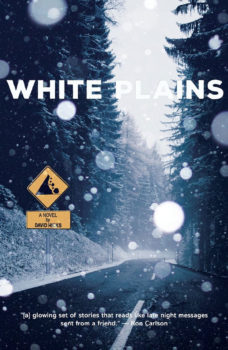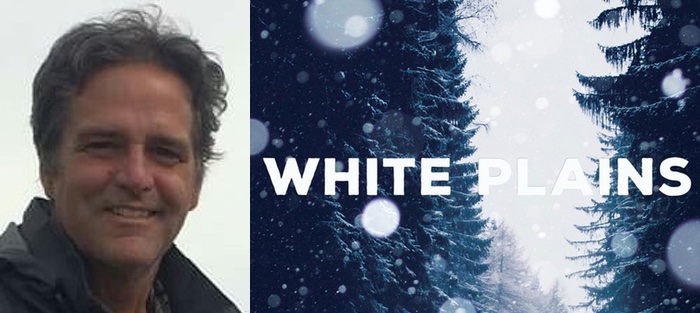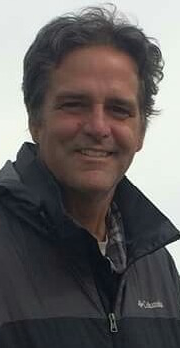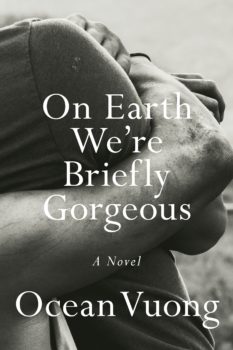Dave Hicks’s debut novel, White Plains (Conundrum Press), opens with a prologue so short it could easily be an epigraph:
This is either a dream or it happened. I’ll never know.
My father at my bedside, saying he has to go, he’s sorry he won’t be at my baseball game. I don’t know what I say back.
As he leaves my room his shoulders are slumped. He doesn’t look back at me when he closes the door.
This passage, sad and eerie and funereal in a way that’s hard to put your finger on, also plays with a productive ambiguity that Hicks declines to resolve until much later in the book: who is narrating this short section? Flynn Hawkins, Hicks’s protagonist, whose father died when he was young, or Flynn’s own son, Nathan, whose mother Flynn eventually leaves?
Fathers who vanish—whether through death or of their own volition—and the mark this loss leaves on their children, is one of White Plains’ main themes. The novel follows Flynn Hawkins, an English professor who leaves his wife and two young children and runs away to Colorado with another woman (a “famous writer” named Casey who may or may not be faking a pregnancy) only to return a few years later in an attempt to win back his children.
Flynn is in turns sympathetic and infuriating, and Hicks’s willingness to let the book live in this ambiguous space, and to risk structural and stylistic choices that make the book actively unsettling, is one of his great strengths as a writer.
Dave Hicks is a professor at Regis University and the co-director of the Mile-High MFA program. His short stories, many of which have been adapted into chapters in White Plains, have appeared in Glimmer Train, Colorado Review, Specs, Saranac Review, and South Dakota Review. White Plains, his first novel, was released last month. Hicks is currently on tour promoting the novel. Dave and I conducted this interview via email over the course of the week leading up to the book’s release:
Interview:
Emily Nagin: I was really excited when I saw you had a book out, because I remembered your story “Sunday Morning at the Silver Spur” from a workshop years ago. And then I came across a version of that story converted into a chapter in White Plains and felt this wonderful shock of recognition, like seeing an old friend. This is a very roundabout way of asking you how this novel came to be. How long have you been writing Flynn Hawkins stories and how did you decide to integrate them into one big project?
 David Hicks: I remember YOUR story as well…I’ve been writing these stories since 2003(!), featuring characters who resembled me but with different names; after I published a bunch and had enough for a collection, I realized that if I put them in chronological order (according to this main character’s life, I mean, not when they were published), it would feel more like a novel than a story collection. But there were pretty wide gaps in the overall narrative, so I added some chapters from different characters’ points of view—Flynn’s sister’s, his ex-wife’s, his children’s, his baseball coach’s—and that helped to fill in some of the gaps and make it feel more like a novel than a story collection. (Hence it is called a “novel-in-stories” rather than a novel or a story collection.)
David Hicks: I remember YOUR story as well…I’ve been writing these stories since 2003(!), featuring characters who resembled me but with different names; after I published a bunch and had enough for a collection, I realized that if I put them in chronological order (according to this main character’s life, I mean, not when they were published), it would feel more like a novel than a story collection. But there were pretty wide gaps in the overall narrative, so I added some chapters from different characters’ points of view—Flynn’s sister’s, his ex-wife’s, his children’s, his baseball coach’s—and that helped to fill in some of the gaps and make it feel more like a novel than a story collection. (Hence it is called a “novel-in-stories” rather than a novel or a story collection.)
If I’m remembering correctly, “Sunday Morning at the Silver Spur” did not originally feature Flynn. And you link to a number of stand alone stories on your website that also became part of the novel. How did you go about choosing and revising non-Flynn stories for this collection?
Well, it featured that autobiographical guy who became Flynn, but I adapted it to the arc of the book by adding elements to it (like when he finds out at the end that he’s lost custody of his children) that weren’t in the original, and changing the location and some of the backstory. But to answer your broader question, I have published stories that did not make it into the book, either because the subject was wrong for it or the tone was wrong. For example, I wrote a comedic piece about the Flynn/Casey relationship, and it’s my favorite story to use at a reading, but it just didn’t “fit” into White Plains. When I put it in there, it felt like an album with all jazzy/sad songs but then a polka at the end.
Did anything about the way the book evolved surprise you?
Yes. I didn’t expect the new chapters—the ones from different characters’ points of view—to be so much fun, so interesting to write, so revealing. Since they’re writing about Flynn, and Flynn is like me, they’re essentially writing about me, so to see myself from others’ points of view felt both strange and surprisingly enjoyable, even though their opinions aren’t altogether flattering.
Also, before the book was finished, I impulsively asked my children to write their own stories, about times when they weren’t with me (like Flynn, I left their mother when they were young), so that I could learn something about them that I didn’t know. And they both surprised me with what they came up with. I wasn’t going to use their stories—I had asked them to write them so that what they wrote would inform my fictional depictions of them—but I wound up including both stories, since I found myself quite moved by them.
Oh, wow! Asking your kids to do some background writing honestly feels like a pretty brave move, and also a smart one. And those chapters—”Me, the Fox” and “Field of Battle”—are so strong. This is a two-part question:
1) Did you keep your kids’ prose verbatim or rewrite it to fit the tone of the novel?
2) How did reading those chapters end up informing Janey and Nathan, the characters based on your kids?
Oh, I rewrote them of course, though not to “correct” anything but to revise them in the same way I would revise my own rough drafts. My son (characteristically) dashed off his story in about fifteen minutes whereas my daughter (also characteristically), in a much more deliberate and pensive fashion, wrote four stories, all pretty sad, two of which I melded into one….They hadn’t read the rest of my book so they had no idea what its themes or narrative threads were; so I revised them with such matters in mind.
I think those two stories certainly inform, and perhaps enhance, the characterizations of Janey and Nathan, in that Nathan—a devastated, sad kid when we first meet him (in “Diamond Dash”)—is turning out to be a pretty typical, adventurous boy, whereas Janey, who was only two when Flynn left, and who everyone thought would probably be “just fine” because she was so young at the time, feels her father’s absence quite profoundly, even if she’s unaware of the source of her pathos. But I think their stories also end up filling out and complicating the main story, Flynn’s story, because the reader can see (even if Flynn can’t) the widespread rippling effect of divorce. And we get what we couldn’t get from Flynn’s point of view: we learn from Janey’s story how lonely she is, how she misses her dad when she’s with her mom and misses her mom when she’s with her dad—a life of missing, really—and we learn from Nathan’s story that they have a surrogate dad, Sam, who’s not conveniently evil but actually a great guy who gets along really well with Nathan. This would complicate Flynn’s fantasy that he will be a great dad and that Nathan desperately needs him, and ratchets up his paranoia (planted by Casey, his Colorado girlfriend) that Janey will never even know him as a father, that Sam has already replaced him and there’s nothing he can do about that.
One thing that really stood out to me about Janey’s and Nathan’s chapters—as well as the chapters from other character’s points of view—is that they’re in first person. But the majority of the book, which belongs to Flynn, is in close third. What made you decide to switch? It’s a particularly interesting move, since Flynn is such an autobiographical character.
I actually had one chapter—”Once Upon a Time at the Kiev”—in second person! But my editor asked me to change it. Let’s see: the easy answer is that those were the original points of view in the stories when they were individually published. But when I put them all together in one volume, I liked the POV-hopping. It added an element to the book that pushes you away, throws you off a little. It’s a little annoying, a little disconcerting, to change points of view, and that’s part of the energy of the book. (As writers, we’re not here to make things smooth and easy for the reader.) As for what this does for me as a writer, the third person gives me the vantage point to be more objective about my autobiographical character—not only to make stuff up about him, but to see him/me more as a character. Look at you, I find myself saying. What are you up to now? It helps me to craft my own story rather than vomit it up. And for that matter, it sometimes helps me to be more intimate; in third person I find myself caring about my character more than first person—whereas first person gives me more “play” with regard to voice.
“Once Upon a Time at the Kiev” is actually the perfect story to use as a pivot from craft to theme. That story is set in New York City just after 9/11, yet the attack itself is never named. I thought this was a really interesting and evocative choice, one I’ve noticed other writers making too—Zadie Smith does it in a tiny little scene in On Beauty—talking around this specific event instead of naming it. What made you decide to handle it that way?
I’ll take my cue from the amazing Zadie any day, but the real source is probably The Scarlet Letter, or The Road, or all the great books that are far more concerned with the consequences of an momentous (personal or global) event rather than the event itself. It’s just much more interesting for me to depict an inner conflict rather than an outer one.
The idea that the personal effects of an event can be more interesting to a writer than the event itself actually leads right into my next question: in one of the early chapters, Flynn and his grad school mentor discuss the Hemingway quote about the world breaking everyone, and people becoming stronger at the broken places. Flynn floats the idea that this might not always be true, that sometimes people just stay broken, and his mentor kind of dismisses him, saying that the idea of permanent brokenness is a young person’s notion. I was so interested by that conversation, because to me, Flynn’s perspective seemed like the more realistic one. But then again, I am a young person. I guess my question is, how would Flynn understand this Hemingway quote at the end of the book? Would he still push against it, or would he agree?
Oooo, that’s a great question. Yes, that’s a moment where Flynn, who has seen both his parents break and stay broken, may be more mature, and I’m also setting up [his mentor] Faustino’s huge “break” at the end. But what Flynn would find by the end of the book is that Faustino/Hemingway is right—or that both views are correct. Because Flynn starts to get stronger at his broken places.
Like that conversation between Flynn and Faustino, the way you handle love—romantic and otherwise—in this book is very complicated and honest feeling. On the one hand, many of the chapters deal with the connection between love and objectification—Flynn admits that he sometimes sees the women in his life as a way to give himself direction, but then again, they’ve done the same thing to him—but there’s also the idea that love is a way of striving against doom or death. How does the idea that love is the only way to combat emptiness tie to the observation that we often objectify the people we care about? Does it link to the notion of being stronger (or not) where we are broken?
I would say that there’s a great difference between love and relationships in this book—Flynn really doesn’t know love, real love, until Nathan is born, and his relationships are fueled mostly by a strong sense of obligation—and at the end Flynn starts to see how they might both go together. But for most of the book, he objectifies women in some form or another as a way to avoid love; because what he’s found out is that love is either incredibly painful, in that you could lose the person you love at any moment, or it’s defined as a task, a burden, and not something that’s ever joyous. He’s simply never had any role models of real love; he has no idea what it looks like. To really care for someone, then, would be kind of scary, so he seems to avoid it at all costs, and one way of doing that is to choose romantic partners who aren’t very loving or whom Flynn knows (unconsciously) would not work out—in a way, it’s safe for Flynn to be miserable. It’s what he knows and it’s what he was shown, every day, when he was young.
That’s a good distinction to make. Okay, final question (it’s a doozy): White Plains focuses a lot on teaching—Flynn is a college professor for much of the book—so I wanted to ask you a question that we ask at the high school where I work when the students create characters:
1) What is Flynn’s favorite song?
2) What’s a song he loves but would never admit he loves?
1) Counting Crows, “Angels of the Silences.” (He listens to it when he wants to stay awake while driving.)
2) Paula Cole, “I Don’t Want to Wait.”







